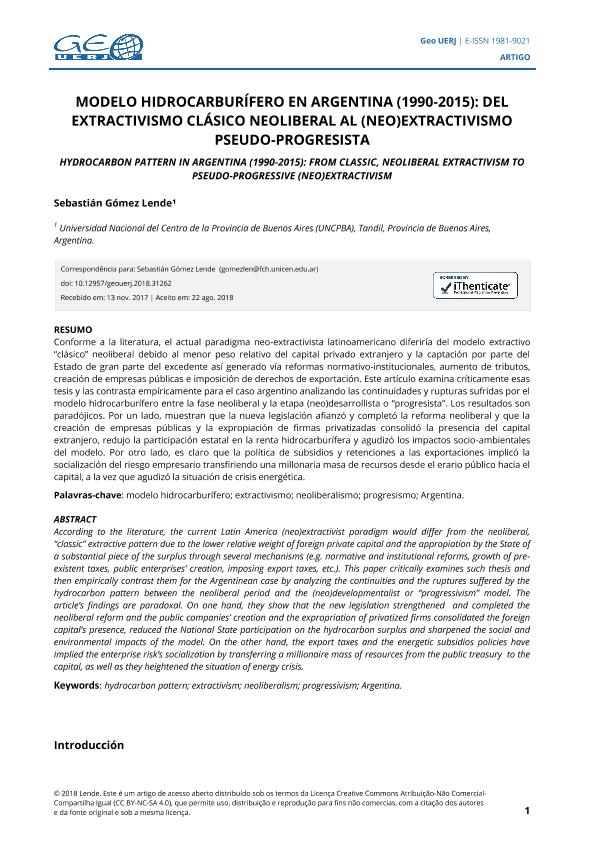Mostrar el registro sencillo del ítem
dc.contributor.author
Gómez Lende, Sebastián

dc.date.available
2019-09-20T18:16:14Z
dc.date.issued
2018-12
dc.identifier.citation
Gómez Lende, Sebastián; Modelo hidrocarburífero en Argentina (1990-2015): del extractivismo clásico neoliberal al (neo)extractivismo pseudo-progresista; Universidade do Estado do Rio de Janeiro. Instituto de Geografia; Geo UERJ; 33; 12-2018; 1-29
dc.identifier.issn
1415-7543
dc.identifier.uri
http://hdl.handle.net/11336/83992
dc.description.abstract
Conforme a la literatura, el actual paradigma neo-extractivista latinoamericano diferiría del modelo extractivo “clásico” neoliberal debido al menor peso relativo del capital privado extranjero y la captación por parte del Estado de gran parte del excedente así generado vía reformas normativo-institucionales, aumento de tributos, creación de empresas públicas e imposición de derechos de exportación. Este artículo examina críticamente esas tesis y las contrasta empíricamente para el caso argentino analizando las continuidades y rupturas sufridas por el modelo hidrocarburífero entre la fase neoliberal y la etapa (neo)desarrollista o “progresista”. Los resultados son paradójicos. Por un lado, muestran que la nueva legislación afianzó y completó la reforma neoliberal y que la creación de empresas públicas y la expropiación de firmas privatizadas consolidó la presencia del capital extranjero, redujo la participación estatal en la renta hidrocarburífera y agudizó los impactos socio-ambientales del modelo. Por otro lado, es claro que la política de subsidios y retenciones a las exportaciones implicó la socialización del riesgo empresario transfiriendo una millonaria masa de recursos desde el erario público hacia el capital, a la vez que agudizó la situación de crisis energética.
dc.description.abstract
According to the literature, the current Latin America (neo)extractivist paradigm would differ from the neoliberal, “classic” extractive pattern due to the lower relative weight of foreign private capital and the appropiation by the State of a substantial piece of the surplus through several mechanisms (e.g. normative and institutional reforms, growth of preexistent taxes, public enterprises’ creation, imposing export taxes, etc.). This paper critically examines such thesis and then empirically contrast them for the Argentinean case by analyzing the continuities and the ruptures suffered by the hydrocarbon pattern between the neoliberal period and the (neo)developmentalist or “progressivism” model. The article’s findings are paradoxal. On one hand, they show that the new legislation strengthened and completed the neoliberal reform and the public companies’ creation and the expropriation of privatized firms consolidated the foreign capital’s presence, reduced the National State participation on the hydrocarbon surplus and sharpened the social and environmental impacts of the model. On the other hand, the export taxes and the energetic subsidios policies have implied the enterprise risk’s socialization by transferring a millionaire mass of resources from the public treasury to the capital, as well as they heightened the situation of energy crisis.
dc.format
application/pdf
dc.language.iso
spa
dc.publisher
Universidade do Estado do Rio de Janeiro. Instituto de Geografia
dc.rights
info:eu-repo/semantics/openAccess
dc.rights.uri
https://creativecommons.org/licenses/by-nc-sa/2.5/ar/
dc.subject
Modelo Hidrocarburífero
dc.subject
Extractivismo
dc.subject
Neoliberalismo
dc.subject
Progresismo
dc.subject
Argentina
dc.subject.classification
Otras Geografía Económica y Social

dc.subject.classification
Geografía Económica y Social

dc.subject.classification
CIENCIAS SOCIALES

dc.title
Modelo hidrocarburífero en Argentina (1990-2015): del extractivismo clásico neoliberal al (neo)extractivismo pseudo-progresista
dc.title
Hydrocarbon pattern in Argentina (1990-2015): from classic, neoliberal extractivism to pseudo-progressive (neo)extractivism
dc.type
info:eu-repo/semantics/article
dc.type
info:ar-repo/semantics/artículo
dc.type
info:eu-repo/semantics/publishedVersion
dc.date.updated
2019-09-10T17:37:43Z
dc.identifier.eissn
1981-9021
dc.journal.number
33
dc.journal.pagination
1-29
dc.journal.pais
Brasil

dc.journal.ciudad
Río de Janeiro
dc.description.fil
Fil: Gómez Lende, Sebastián. Consejo Nacional de Investigaciones Científicas y Técnicas. Centro Científico Tecnológico Conicet - Tandil. Instituto de Geografía, Historia y Ciencias Sociales. Universidad Nacional del Centro de la Provincia de Buenos Aires. Instituto de Geografía, Historia y Ciencias Sociales; Argentina
dc.journal.title
Geo UERJ

dc.relation.alternativeid
info:eu-repo/semantics/altIdentifier/url/https://www.e-publicacoes.uerj.br/index.php/geouerj/article/view/31262
dc.relation.alternativeid
info:eu-repo/semantics/altIdentifier/doi/http://dx.doi.org/10.12957/geouerj.2018.31262
Archivos asociados
